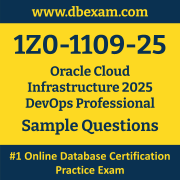 The Oracle Cloud Infrastructure DevOps Professional (1Z0-1109-25) Sample Question Set is designed to help you prepare for the Oracle Cloud Infrastructure 2025 Certified DevOps Professional certification exam. To become familiar with the actual Oracle Certification exam environment, we suggest you try our Sample Oracle 1Z0-1109-25 Certification Practice Exam.
The Oracle Cloud Infrastructure DevOps Professional (1Z0-1109-25) Sample Question Set is designed to help you prepare for the Oracle Cloud Infrastructure 2025 Certified DevOps Professional certification exam. To become familiar with the actual Oracle Certification exam environment, we suggest you try our Sample Oracle 1Z0-1109-25 Certification Practice Exam.
This Oracle Cloud Infrastructure 2025 DevOps Professional certification sample practice test and sample question set are designed for evaluation purposes only. If you want to test your Oracle 1Z0-1109-25 knowledge to identify your areas of improvement and get familiar with the actual exam format, we suggest you prepare with the Premium Oracle Cloud Infrastructure 2025 Certified DevOps Professional Certification Practice Exam. Our team of Oracle Cloud Infrastructure experts has designed Questions-Answers for this premium practice exam by collecting inputs from recently certified candidates. Our premium Oracle 1Z0-1109-25 certification practice exam will boost your confidence as well as your actual Oracle Cloud Infrastructure DevOps Professional exam result.
Oracle 1Z0-1109-25 Sample Questions:
Answers:
|
Question: 01 Answer: d |
Question: 02 Answer: a |
Question: 03 Answer: b |
Question: 04 Answer: c |
Question: 05 Answer: a |
|
Question: 06 Answer: c |
Question: 07 Answer: b |
Question: 08 Answer: c |
Question: 09 Answer: b |
Question: 10 Answer: d |
